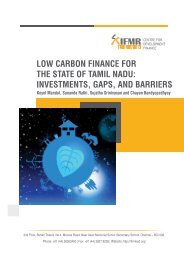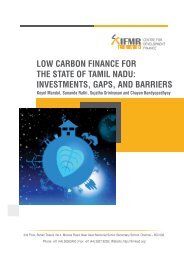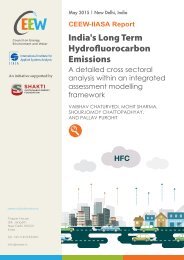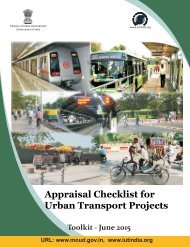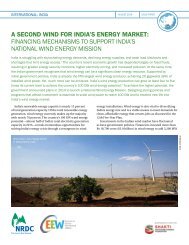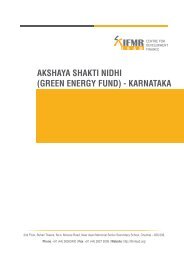Enhancing India’s Readiness to Climate Finance
India has taken several steps to improve its national response to climate change. India’s climate finance requirements, however, are very high, and will need to be met through a combination of public, private and international climate finance. See more at: http://shaktifoundation.in/
India has taken several steps to improve its national response to climate change. India’s climate finance requirements, however, are very high, and will need to be met through a combination of public, private and international climate finance. See more at: http://shaktifoundation.in/
- No tags were found...
You also want an ePaper? Increase the reach of your titles
YUMPU automatically turns print PDFs into web optimized ePapers that Google loves.
<strong>Enhancing</strong> <strong>India’s</strong> readiness <strong>to</strong> access and deliver international climate finance<br />
Annex VI – Adaptation Fund Profile<br />
Fund Overview<br />
The Adaptation Fund is an international<br />
mechanism of the Kyo<strong>to</strong> Pro<strong>to</strong>col that<br />
became operational in 2009. The AF uses<br />
grant funding <strong>to</strong> finance the full costs of<br />
concrete adaptation programmes in<br />
developing countries. It is funded through a<br />
2% levy on transactions under the Clean<br />
Development Mechanism (CDM), although<br />
in reality it has relied heavily on grant<br />
contributions from Annex 1 countries as<br />
well. To date, the Adaptation Fund has<br />
approved $211.57 million and disbursed<br />
$69 million in 31 countries. The AF’s<br />
activities have targeted interventions in the<br />
water, land-use, agriculture, health,<br />
infrastructure, and ecosystems services<br />
focal areas. Funds have also been used <strong>to</strong><br />
develop early warning systems and<br />
support capacity building for disaster-risk<br />
reduction. In 2013 the AF was replenished<br />
with $100 million, mostly from European<br />
countries.<br />
GOVERNANCE STRUCTURE<br />
Adaptation<br />
Accreditation<br />
Secretariat<br />
Trustee<br />
Fund Board<br />
Panel<br />
(GEF)<br />
(WB)<br />
2 representatives from each of the<br />
five United Nations regional groups<br />
1 representative from Small Island<br />
Developing States<br />
1 representative from Least<br />
Developed Country Parties<br />
2 representatives from Annex I<br />
Parties<br />
2 representatives from non-Annex I<br />
Parties<br />
Observers<br />
Institutional mechanism <strong>to</strong> access the Adaptation Fund<br />
One of the Adaptation Fund’s most unique design features is that it allows for ‘direct access’ of funds by national<br />
implementing entities from developing countries. Direct access gives greater country ownership over climate<br />
change programme, and ensures for decentralised decision-making nearer <strong>to</strong> the level where climate change<br />
impacts occur. Fifty percent of Adaptation Funding has been ear-marked for NIEs, although only sixteen have<br />
been accredited <strong>to</strong> date, and only 5 have received funding. The remaining 50% of Adaptation Fund finance is<br />
available for projects managed by Regional Implementing Entities, and Multilateral Implementing Entities.<br />
<strong>India’s</strong> experience accessing the Adaptation Fund<br />
The National Bank for Agriculture and Rural Development is <strong>India’s</strong> NIE for the Adaptation Fund. It is<br />
responsible for overall project management; financial management; M&E; and for performing a supervisory role<br />
for government departments, research institutions, NGOs, etc. that act as executing agencies on projects.<br />
In March 2014, the Adaptation Fund Board gave initial approval for three adaptation project concepts in India, all<br />
managed by NABARD. These funds have not yet been disbursed.<br />
Table VI.1: Adaptation Fund project pipeline for India<br />
Project<br />
<strong>Climate</strong> Proofing of Watershed Development Projects in the States of Tamil Nadu and<br />
Rajasthan<br />
Building Adaptive Capacities of Small Inland Fishermen Community for <strong>Climate</strong><br />
Resilience and Livelihood Security, MP, India<br />
<strong>Enhancing</strong> Adaptive Capacity and Increasing Resilience of Small and Marginal<br />
Farmers in Purulia and Bankura Districts of West Bengal<br />
Cost ( USD million)<br />
1.227<br />
1.738<br />
2.534<br />
Ref: Ricardo-AEA/R/ED59216/Final Report<br />
70




